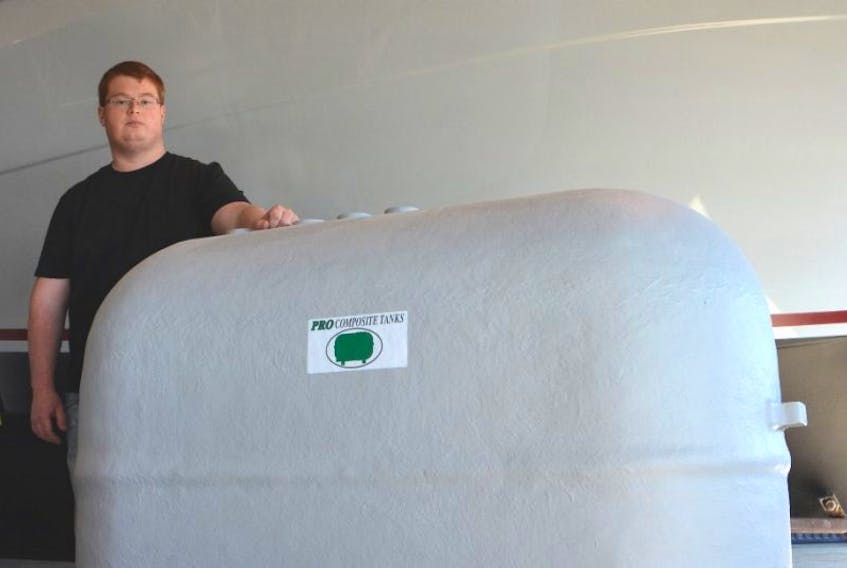Since 1974, the company built a reputation for quality and craftsmanship, building fibreglass lobster fishing boats for the domestic and export markets.
Gordon Campbell began working at Provincial shortly after it opened, and later purchased the company.
“We sat back for a number of years and said: ‘Well, we build boats. That’s it; that’s what we do. What else can we do?’” Campbell reflected.
It worked for him. In 2004, his son, Jay, also joined the company after earning a political science degree with a minor in business.
The company did branch out to pleasure boats, but the impact of the banking collapse in 2009 was devastating. Also sinking demand were low lobster prices and a rising Canadian dollar.
The company had no orders and was forced to layoff the entire workforce, but the Campbells weren’t prepared to abandon the business entirely.
“We decided we needed to go in another direction and find some employment for our people,” Gordon said.
Fortunately, lifelines appeared. Malley Industries Inc. of Dieppe, N.B., offered sub-contract work for van tops. A local businessman approached to partner for production of driveway markers that simulated Island-stone columns.
The most promising idea for diversification, however, was drawn from boatbuilding expertise. They decided to look at fibreglass oil tanks for home heating, since regulatory pressure was increasing prospects for that product and fuel tanks were already part of boatbuilding.
It was just a natural progression, the Campbells explained.
Demand for fibreglass tanks is substantial from P.E.I. and Atlantic Canada. Oil is extensively used as a home-heating fuel in the region, Jay identified, and governments have moved to ban exterior installation of metal oil tanks due to containment failures. P.E.I. followed suit in 2012.
“We’re very dependent on groundwater, so environmental issues are very important,” Jay said.
The Campbells made the design changes they thought they would need, and started the process by building molds and creating tanks to send away to Underwriters Laboratories for safety standards testing.
“We looked at what worked. We didn’t want anything to be so radically different that customers wouldn’t buy it,” Jay explained.
They didn’t specifically compare their design with other fibreglass tanks on the market, nor see any need to patent what they designed, even though the company’s new division, Pro Composite Tanks, would eventually apply a 30-year warranty to their product.
Being approved by UL required a rigorous, three-year process, but the outcome permits sales domestically and in the United States.
Pro Composite Tanks can now produce and sell. UL testing was completed in January, final inspection in February, and completion of minor detailing means the first shipment will roll out at the end of March, confirmed Jay, who is now supervisor of the new division.
Provincial Boat and Marine Ltd. has survived. It only has about half its labour force back, but expects to return to its former peak and perhaps exceed it.
The Campbells are confident about the company’s production of three new products, and two fishing boat orders from the United States improve prospects even further.
“Diversification is very important. It is something we learned,” Jay assessed.
Gordon agreed with his son’s assessment and will respect the lesson.
“After we get the tanks up and running, get some production going, and get some money flowing in, we would consider maybe looking at something else… if (workers can be found) to build the product,” he proposed.
Since 1974, the company built a reputation for quality and craftsmanship, building fibreglass lobster fishing boats for the domestic and export markets.
Gordon Campbell began working at Provincial shortly after it opened, and later purchased the company.
“We sat back for a number of years and said: ‘Well, we build boats. That’s it; that’s what we do. What else can we do?’” Campbell reflected.
It worked for him. In 2004, his son, Jay, also joined the company after earning a political science degree with a minor in business.
The company did branch out to pleasure boats, but the impact of the banking collapse in 2009 was devastating. Also sinking demand were low lobster prices and a rising Canadian dollar.
The company had no orders and was forced to layoff the entire workforce, but the Campbells weren’t prepared to abandon the business entirely.
“We decided we needed to go in another direction and find some employment for our people,” Gordon said.
Fortunately, lifelines appeared. Malley Industries Inc. of Dieppe, N.B., offered sub-contract work for van tops. A local businessman approached to partner for production of driveway markers that simulated Island-stone columns.
The most promising idea for diversification, however, was drawn from boatbuilding expertise. They decided to look at fibreglass oil tanks for home heating, since regulatory pressure was increasing prospects for that product and fuel tanks were already part of boatbuilding.
It was just a natural progression, the Campbells explained.
Demand for fibreglass tanks is substantial from P.E.I. and Atlantic Canada. Oil is extensively used as a home-heating fuel in the region, Jay identified, and governments have moved to ban exterior installation of metal oil tanks due to containment failures. P.E.I. followed suit in 2012.
“We’re very dependent on groundwater, so environmental issues are very important,” Jay said.
The Campbells made the design changes they thought they would need, and started the process by building molds and creating tanks to send away to Underwriters Laboratories for safety standards testing.
“We looked at what worked. We didn’t want anything to be so radically different that customers wouldn’t buy it,” Jay explained.
They didn’t specifically compare their design with other fibreglass tanks on the market, nor see any need to patent what they designed, even though the company’s new division, Pro Composite Tanks, would eventually apply a 30-year warranty to their product.
Being approved by UL required a rigorous, three-year process, but the outcome permits sales domestically and in the United States.
Pro Composite Tanks can now produce and sell. UL testing was completed in January, final inspection in February, and completion of minor detailing means the first shipment will roll out at the end of March, confirmed Jay, who is now supervisor of the new division.
Provincial Boat and Marine Ltd. has survived. It only has about half its labour force back, but expects to return to its former peak and perhaps exceed it.
The Campbells are confident about the company’s production of three new products, and two fishing boat orders from the United States improve prospects even further.
“Diversification is very important. It is something we learned,” Jay assessed.
Gordon agreed with his son’s assessment and will respect the lesson.
“After we get the tanks up and running, get some production going, and get some money flowing in, we would consider maybe looking at something else… if (workers can be found) to build the product,” he proposed.









